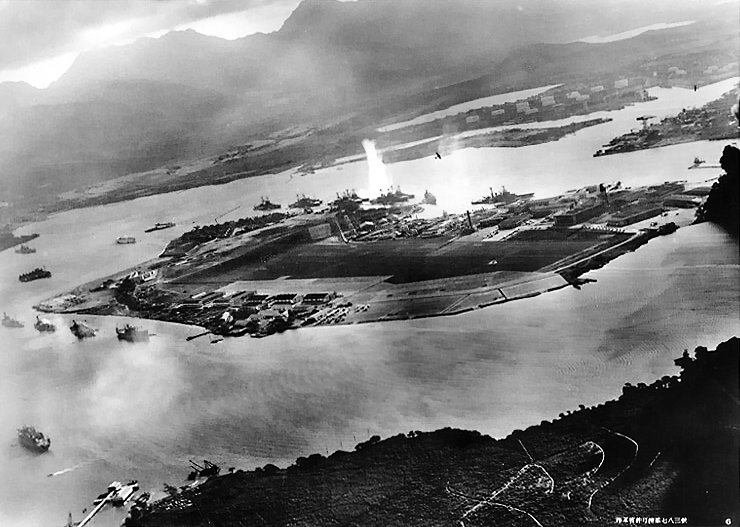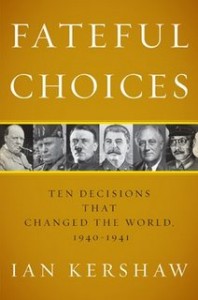
Fateful Choices, by Ian Kershaw: Japan, Germany, USA (updated 2019)
Fateful Choices: Ten Decisions that Changed the World, 1940-1941, by Ian Kershaw. New York: Penguin, 600 pp., $35. At a time when Churchill’s war leadership is vilified in lopsided paeans to Roosevelt, Sir Ian’s classic World War II study reminds us that FDR wasn’t perfect either.
A recent article suggests that Japan’s decision to surrender in 1945 was by no means unanimous. A few years ago, Sir Ian Kershaw said the same thing about Japan’s decision to go to war in the first place. Long before the war, Winston Churchill mused:
“What a story! Think of all these people—decent, educated, the story of the past laid out before them—What to avoid—what to do etc.—patriotic, loyal, clean—trying their utmost—What a ghastly muddle they made of it! Unteachable from infancy to tomb—There is the first and main characteristic of mankind.”—Churchill to Lord Beaverbrook, 21 May 1928.

Kershaw, whose two-volume biography of Hitler is highly acclaimed, has written a fascinating book on what Churchill might call the “ten climacterics” of World War II: Britain’s decision to fight on in May 1940; Mussolini’s decision to attack Greece; Stalin’s decision to trust Hitler; Japan’s decisions to expand southward and to take on the United States; Roosevelt’s decisions to help Britain and to wage undeclared war against Germany; Hitler’s decisions to attack Russia, to declare war on the USA and to commit genocide in Europe.
Hull Reconsidered
I had no deep prejudices toward Cordell Hull until I read this book, but Kershaw paints Roosevelt’s Secretary of State the way Churchill allegedly painted John Foster Dulles: “He is the only bull I know who carries his china shop with him.”
As the clock ticked in late 1941, Hull frustrated negotiations at every turn. He rightly rejected the Japanese “Plan A,” amounting basically to letting Japan run amok in East Asia. Then he seemed to accept, but finally rejected, “Plan B,” which offered a pullback of Japanese forces from Indo-China and an agreement to vacate China “at an agreed future date.”
Nor was Roosevelt consistent: “While Hull and the State Department dampened prospects of an accommodation, the President himself appeared still open to the possiblity of one” (367). In his vacillating, don’t-tell-them-everything-you’re-thinking approach, he ran hot and cold on requested meetings with Japan’s foreign minister or Emperor. First FDR would hint that he wanted a “modus vivendi”; then he would play hardball, refusing to consider any terms by which he would normalize relations.
* * *
Finally Hull, without consulting either the military or unofficial allies like Britain (which might have had some useful warnings about piling up new enemies) replied with his “Ten Points,” including all previous demands and some new ones. In exchange for normalized relations Japan was required “to withdraw from China and Indochina, renounce extraterritorial rights and concessions dating back to the turn of the century, following the Boxer Rebellion, to recognize no Chinese government but that of Chiang Kai-shek, and effectively to abrogate the Tripartite Pact with Germany and Italy (369). Those were terms no Japanese government could accept. Also, Hull was unclear as to whether he also demanded Japan’s exit from Manchuria, where it had established the puppet state of Manchukuo in 1931. In fact he did not—but he didn’t bother to make this clear.
Too late FDR realized, “this means war”; he did not know Pearl Harbor would be a target, but he must have known he had backed Japan into a corner. Call me a cynic and you’ll be right: but if a modern President and his Secretary of State handled say China like Roosevelt and Hull handled the Japanese, and ended up getting into a war, there would be a full-scale outcry.
Hitler’s declaration of war
Kershaw carefully examines Hitler’s decision to declare war on America four days after Pearl Harbor. He reviews Hitler’s pronouncements and thoughts on the “American Union” from his earliest speeches. The Western Hemisphere never seriously figured in Hitler’s plans (despite the now-famous British forgery of a German map carving up South America).
Hitler thought the European armaments industry was greater than the American. “He had experienced American soldiers in the First World War [and believed] the Germans were far superior” (405). But longer term, he realized that Germany was on borrowed time. He knew when he invaded Russia that he must win quickly, compel Stalin’s surrender, and then finish off Britain with his full forces. By 1943, Hitler said, America’s mighty engine of industry would be fully engaged. Any hope in Germany for European mastery would be ended. Thus the Fuehrer warned his trigger-happy naval chief, Admiral Raeder, to avoid provocations in the Atlantic, even after Roosevelt had occupied Iceland and expanded the Atlantic security zone far to the east.
Why then did Hitler declare war after Pearl Harbor? Logic, Kershaw argues, played no part. The Tripartite Pact (Hitler’s stated reason) required Germany to declare war only if Japan had been attacked. The idea that he went to war to “fulfill a commitment” to Japan seems far-fetched. (When did Hitler honor commitments?) Pearl Harbor infuriated the Americans. Absent a German declaration, Kershaw suggests, Congress might not have declared war on Germany. Churchill’s rush visit to Washington after Pearl Harbor was predicated on his anxiety that America should adopt a policy of “Germany first.” Roosevelt would have preferred to put off that visit, lest Congress get the idea that Churchill was exerting undue influence on Administration policy.
Explaining the inexplicable
In declaring war, Hitler took little military advice other than that of Raeder. Yet even the Navy chief admitted that in December 1941 not one U-boat was anywhere near the United States. The German declaration astonished even sycophants like Goebbels. Many experienced soldiers privately (very privately) confessed they saw doom in Hitler’s act (383).
Why did Hitler do it? The answer, it seems, was a “shrug.” Hitler knew that sooner or later Germany would have to confront the Americans. Why not now? It proved fatal.
Despite his disdain of the Americans, Kershaw notes, Hitler by autumn 1941 had “contemplated for the first time the possibility of defeat,” saying “that if in the end the German people should not prove strong enough, then Germany deserved to go under and be destroyed by the stronger power.” (This reminds us of Hitler’s “scorched earth” orders to Speer as the Russians advanced on Berlin in 1945.) Kershaw sees Hitler’s war declaration as revealing. “Beneath the veneer, Hitler seems to have recognized that his chances of total victory had by now all but evaporated…. It was a characteristic attempt to wrest back the initiative through a bold move. But…doomed from the very outset to failure” (430).
Irrational rationales
“What a story!” Japan is of two minds about going to war. The United States is also of two minds—or is she? Between Roosevelt and Hull, it is hard to tell. Emperor Hirohito and his entire cabinet believe that if they go to war, they will probably lose. So…to war they go!
Hitler through December 1941 practices uncharacteristic restraint in not provoking the Americans. He couldn’t afford such a mighty enemy until the Russians were subdued. If America was involved, he surmised Germany would lose. Then…to war he goes.
Fateful Choices is a revealing commentary on the occasional (one hopes) irrationality of high-level decision-making. This book which ought to be read by our leaders (present and future), before they do something stupid. Again.






